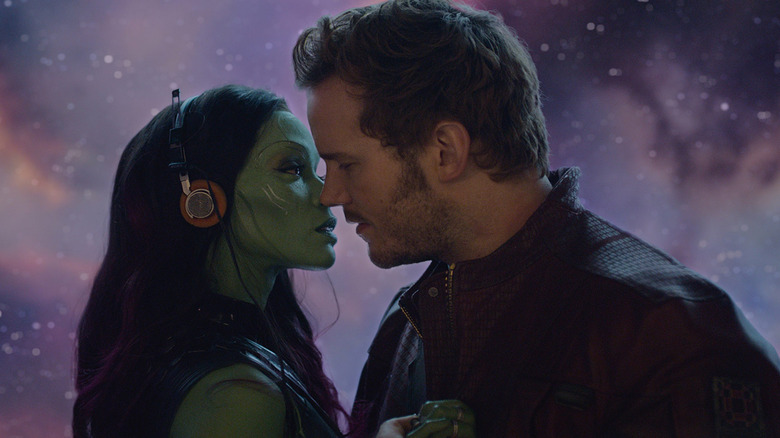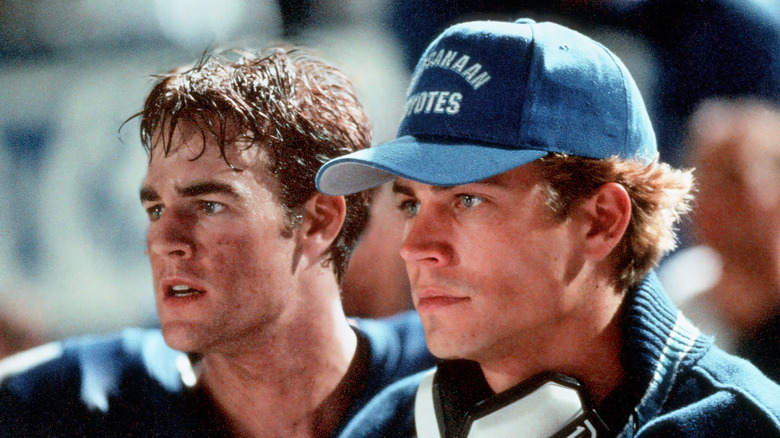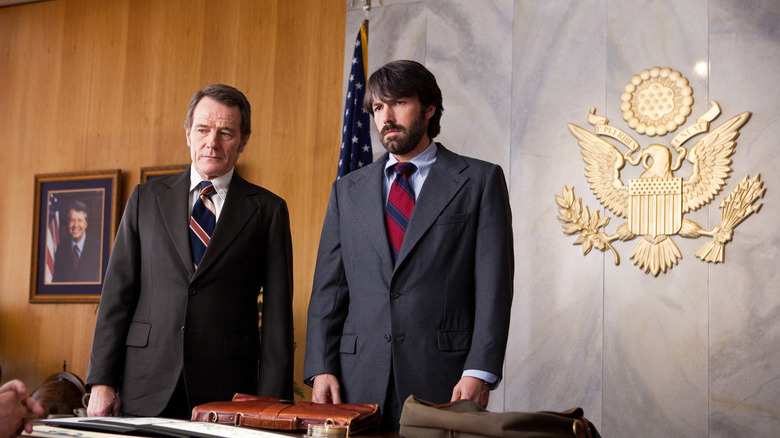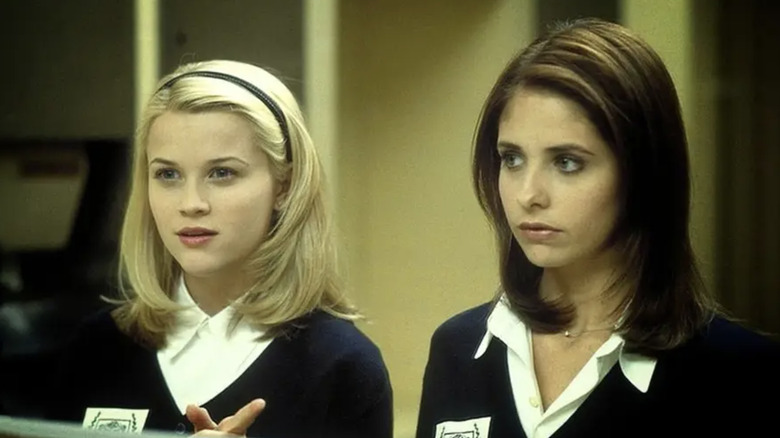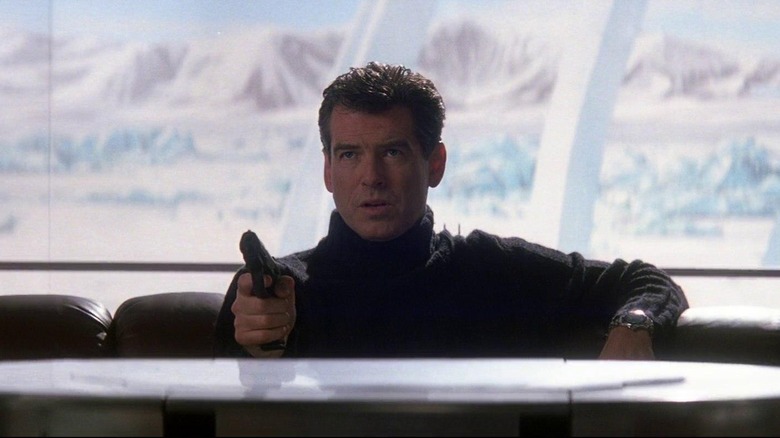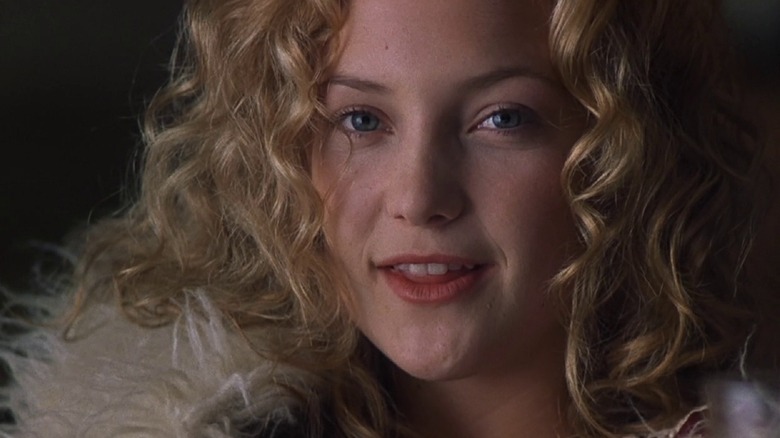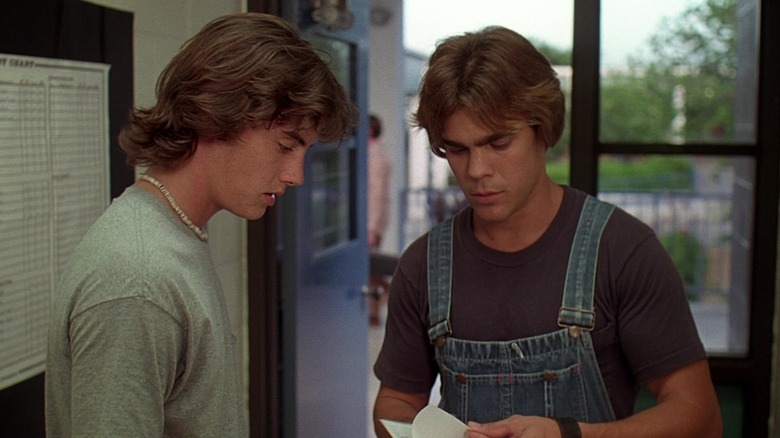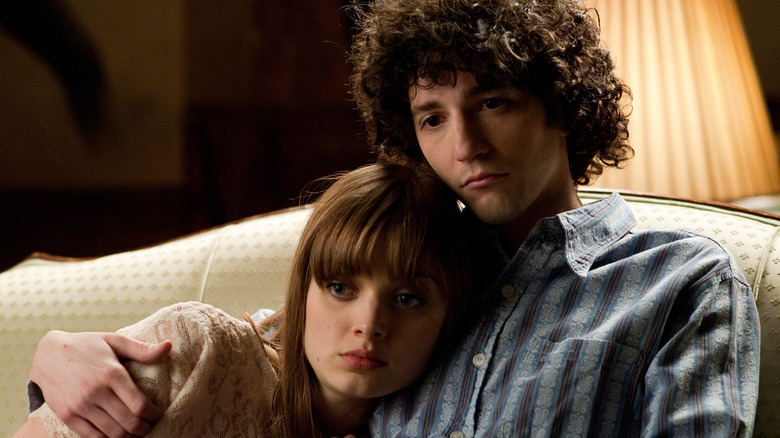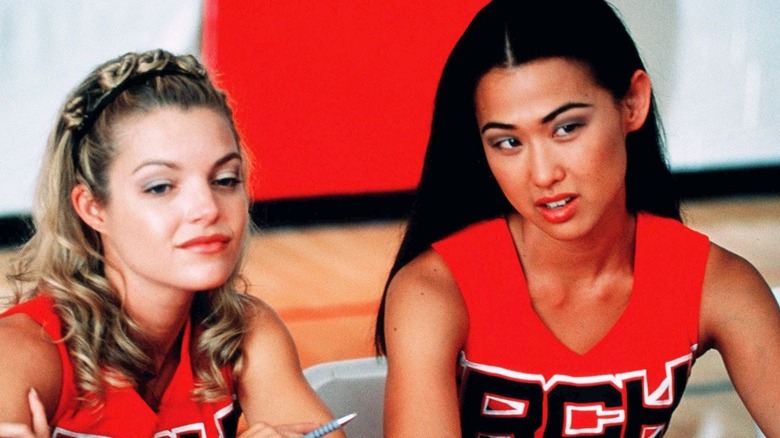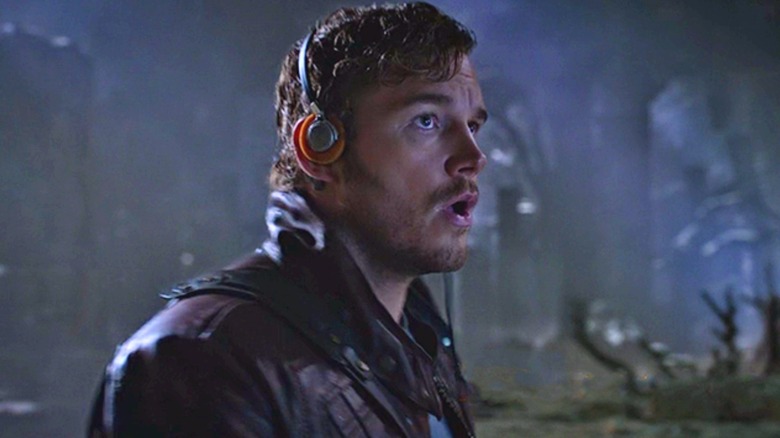The Most Expensive Pieces Of Music Ever Used In The Movies
Movies would be nothing without the soundtracks and compositions that bring them to life. If you've ever wondered about the full impact that a score or song adds to the general tone and intent of a scene, just watch the viral video that replaces "The Imperial March" with "True" by Spandau Ballet in "Star Wars: A New Hope" when Darth Vader enters and Tarkin swallows. Is Vader's right-hand man swallowing in fear or because he's nervous about his first date with Darth? Well, it depends on the music.
So, it's easy to see why studios will pay massive amounts of money (and a significant portion of the overall budget) to pick songs that are just right for a scene. Sometimes, writers have a piece of music in mind when they write a script. Other times, it comes after the fact. And though it's not necessarily the first thing fans think of when it comes to movie budgets, music choices can be as integral, if not more so in some cases, than casting.
Of course, specific numbers on most song licensing fees are hush-hush, which could be because studios don't want it getting out how much they're willing to pay for certain needle drops. While an AC/DC or Zeppelin track is often worth the hefty fee, movie bigwigs don't want overall costs to rise. As a result, there's only so much we have to go on determining the priciest beats and soundtracks in movies.
Varsity Blues
"Varsity Blues" music coordinator, Thomas Golubic, didn't shy away from price dropping just how much it costs to snag an AC/DC number to Variety. When it comes to the band's iconic song, "Thunderstruck," the anthem is worth every penny of its massive $500,000 fee. The track has become synonymous with high-stakes sporting moments, making its appearance during a particularly tense football sequence a slam dunk (because touchdown is too on the nose). The song builds anticipation and momentum with every guitar sequence, perfectly encapsulating the high intensity of a crucial play.
Golubic told Variety: "I remember being absolutely horrified when I heard that number, and we spent a lot of time coming up with what we thought were great alts, but there was going to be no budging on that. And they had money, so they paid for it." It pays (literally) to have a thick movie budget where filmmakers don't have to compromise on their favorite proposed song selections.
Not all movies have that luxury, but as Golubic noted, having the right needed drops lends credibility to a project — especially ones that are decade-specific. Of course, "Varsity Blues" wasn't the last film to use the iconic chords of "Thunderstruck" in a movie. "Deadpool 2" and "Thor: Ragnarok" are just two of the many films willing to pay a hefty price tag for the classic number.
Argo
Led Zeppelin is notoriously picky with the projects they greenlight songs for — and the group is passionate about the accuracy of these moments. "Argo" made the cut, but not before a whole lot of negotiation. Not every movie moment has a clear-cut musical choice that's immediately obvious to creatives. Sometimes, it takes dozens of pitches to decide on the right track — and that's just the first step to acquiring the rights.
Ben Affleck told Los Angeles Times that he and editor William Goldberg cycled through 40 song choices and landed on "Hotel California" before pivoting to something subtler. Ultimately, Affleck opted to go with Zeppelin's "When the Levee Breaks," but the actor knew it would be an uphill battle from there. He noted, "It's got an ominous feeling, but it's celebratory in a sense as well," adding, "Zeppelin, to me, is the greatest rock 'n roll band. People say, 'The Beatles, the Stones.' No. It's Zeppelin."
Led Zeppelin is a stickler for authenticity, and because the shot was filmed prior to the song choice, the band wanted the needle to land accurately on the record during the scene. As a result, the film had to pay for some post-production TLC. The iconic U.K. band is known to have licensing rights in the $1 million range, so that cost plus the special effects fee was no doubt an outrageously expensive number. "So not only did we have to pay for the song, we had to pay for an effects shot," Affleck explained. "You have to appreciate their attention to detail, though."
Cruel Intentions
As it turns out, a movie doesn't need to use the original studio recording of a song to pay a hefty licensing fee. Another '90s movie shelled out a pretty penny to use "Bitter Sweet Symphony" — a piece that faced a lawsuit for sampling The Rolling Stones' "The Last Time." It's typically never a good idea to tick off a band with that much clout (and handsomely paid attorneys), and The Verve got that lesson tenfold as the Stones walked away with all royalties to the song. For what it's worth, The Verve frontman, Richard Ashcroft, is still determined to get some of that money back, saying on the "Kyle Meredith with..." show in 2018 (via NME), "Someone stole god knows how many million dollars off me in 1997, and they've still got it."
It's one thing to spend 10% of a movie's overall budget on the soundtrack as a whole, but it's quite another to spend it on one song. Yet for those that don't have a massive budget, sometimes, one iconic piece of music is all a film needs to cement itself into cinematic history.
"Cruel Intentions" remains a staple of the '90s, partly due to the iconic "Bitter Sweet Symphony" sequence. Producer Neal Moritz told Entertainment Weekly: "The song cost close to a million dollars, which was probably ten percent of the budget," adding, "When we thought it was going to be hopeless to get, we tried 200 other songs in its place. We could not find anything even close to it. It was well worth it." There's no denying that the ending just wouldn't be the same without the Verve's slow number at the end — even if they didn't get paid for it.
Die Another Day
Creating a song and music video for a movie is undoubtedly different than licensing an already-established song. But sometimes, that price far surpasses most licensing agreements. That was the case for Madonna's "Die Another Day" video which cost a hefty $6.1 million to make. The song was released in conjunction with 2002's "Die Another Day," and the clip is considered to be the second most expensive music video of all time (surpassed only by Michael and Janet Jackson's "Scream").
Pierce Brosnan may be a fan-favorite James Bond, but audiences panned the film. Madonna's song opens the movie, and audiences were as disenchanted with the number as the flick as a whole. The music icon even makes a cameo in the movie, playing a fencing instructor named Verity — which was basically product placement for her music video. Naturally, the priciest aspect of the music video is thought to be the sequence where Madonna fences herself.
Madonna's cameo in "Die Another Day" is as baffling as the music video itself. Given the hefty budget of the video, it's a bummer that the sequence wasn't more of a success. Only Madonna, the studio, and the creatives know how much money she received to sign on and record the song in the first place. Was it worth it? Fans don't think so. Even iconic musician Elton John dubbed the track "the worst Bond tune ever" when speaking to Sky News (per CBS). "It hasn't got a tune," John said. "James Bond themes are usually very camp and this one's different..."
Almost Famous
What does it take to get almost famous? Going approximately $15 million over budget, apparently. Cameron Crowe's movie raked up $3.5 million dollars over budget, maxing the film out at a staggering $60 million. The movie didn't even come close to making that back, but the 2000 film was a hit with audiences and critics alike.
Naturally, a movie chronicling the saga of Crowe's stint as a journalist for Rolling Stone in the '70s would require an intense music budget, given how notoriously expensive classic rock jams are to license. Crowe had the upper hand, having developed relationships with many of these rockstars during his time as a journalist. But that didn't help to toe the bottom line very much. However, the budget may have gone up even more without Crowe's connections to the industry greats, and without every single song in the movie, fans would miss out on a puzzle piece to a masterpiece.
According to the Los Angeles Times, "Almost Famous" boasted a $3.5 million music budget, which is over half of the norm. Though the studio clearly wasn't happy over the financial flop, the film took home an Academy Award for best original screenplay on top of several Oscar nominations. And with a soundtrack that includes tracks from Led Zeppelin, Elton John, David Bowie, Simon & Garfunkel, Rod Stewart, and Lynyrd Skynard, how could fans not love the movie decades later?
Dazed and Confused
"Dazed and Confused" may be an indie venture, but it's yet another film that hinges on a soundtrack. Though the Richard Linklater movie remains the epitome of '90s stoner culture, the film stands up today — and that's due in part to its soundtrack.
On some level, it's pretty impressive that the film scored tracks by Bob Dylan, Lynyrd Skynyrd, and Aerosmith for just over $1 million of the film's $6.9 million budget; that's roughly one-sixth of the movie's total budget. Like many cult classics, "Dazed and Confused" has grown in popularity over the years. However, the venture only brought in just under $8 million at the box office — which is just over $1 million in profits when you account for the movie's budget.
But sometimes, you've just got to do it for the art. Some of pop culture's most influential movies either lost money or barely made a profit, but they continue to inform films today like 2016's "Everybody Wants Some!!." Ironically, the film that was dubbed a "spiritual sequel" to Linklater's masterpiece brought in less than its $10 million budget despite being a critic hit. And with songs like "Sweet Emotion," "Paranoid," and "Hurricane," fans aren't forgetting "Dazed and Confused" anytime soon. But when will people learn to trust Linklater and show up in theaters? The guy clearly knows what he's doing, and his music taste is impeccable and spot-on for period pieces.
Not Fade Away
Period pieces are always a doozy when it comes to acquiring music rights. Obviously, a movie set anywhere from the '60s to the '80s just won't feel authentic without including some of those formative bands that shaped those decades. Of course, there was music from that time period that wouldn't cost an arm and a leg to license, but without the hits, there's almost no point in doing a throwback movie.
David Chase's 2012 film, "Not Fade Away" is literally named after a Buddy Holly song, so music is naturally the cornerstone of the movie. Dozens of songs grace the soundtrack, including The Beatles' "I Want to Hold Your Hand," "Please Mister Postman," and "I Want to Tell You." The movie also boasts multiple Rolling Stones songs that include, "(I Can't Get No) Satisfaction" and "I Just Want to Make Love to You."
According to the Los Angeles Times, "Not Fade Away" spent 10% of its budget on acquiring music rights, and given the slate of bands included on the soundtrack, it could have been way more if not for music supervisor Steven Van Zandt's relationship with bands like the Stones. Chase said: "When we made the deal with the Beatles' and Stones' people, especially the Stones people, we told them we would not use the big hits." Luckily, the Stones still played ball when Chase decided that the movie needed the guitar riff of "(I Can't Get No) Satisfaction."
Bring It On
"Bring It On" is arguably one of the most iconic teen movies of all time. And speaking of icon status, Warrant's "Cherry Pie" has become synonymous with stripping routines in TV and film. Yet the song isn't just relegated to late-night club scenes or testosterone-filled dreams. There's no denying that the cheerleader tryouts sequence in "Bring It On" is one of the film's most memorable scenes, and that's due in part to Warrant's steamiest number.
One student at Rancho Carne High School tries out for the cheer squad with a routine that is absolutely not appropriate for high school — fit with a table dance and something that comes dangerously close to a lap dance. So, what song could they possibly use other than "Cherry Pie"? Director Peyton Reed told DVD Talk that they paid $40,000 to use the song — and that was after negotiations.
"Both the stripper tryout and the bikini car wash were so reminiscent of '80s teen movies, we needed the music to match that tone." Reed said. "To me, Cherry Pie was the perfect fit. It is such a cheesy mid-80s song with the worst, most obvious lyrics to it. It gave me a sense of irony about it — which I thought was really important." The director considered other songs, but he noted that many were "too nasty and too dirty" for what they were trying to do. Reed continued: "When you get over the fact that it costs $40,000.00 — and originally it was going to be more, but that's the price they got it down to. We changed some other things to try to get the overall budget down. There are times when you just have to fight for something like that."
Guardians of the Galaxy
It's no secret that the "Guardians of the Galaxy" franchise is well-known for its "Awesome Mix" soundtracks. Additionally, the iconic thing about the music used in the MCU films stems from the fact that everything is built around these numbers. Whether it's CGI, fight sequences, and even colors, the franchise goes with the flow of the music, making it feel alive.
Between David Bowie's "Moonage Daydream," and The Runaways' "Cherry Bomb," "Guardians" set the franchise up for a slate of iconic soundtracks. Of course, Disney and Marvel Studios are mum on the exact pricing breakdown of their films, but director James Gunn has hinted at music costs. In a now-deleted tweet (via ComicBook.com), he confirmed that he's paid anywhere from $0 to $1 million for a song, but he wouldn't confirm which track demanded the seven-figure sum. "It was probably the only song I'd ever want to pay that much for," Gunn tweeted. "It was a rare, rare case of not getting the rights before we shot, changing the song in post, & really needing the song for the movie to work."
Though the film raked in plenty of profits at the box office, "Guardians" did, in fact, come in over budget. Gunn also admitted in his series of 2022 tweets that he couldn't get a song for "Peacemaker" that he had his heart set on and that a proposed "Guardians of the Galaxy Vol. 3" song "was in a legal battle over who owned it, so we didn't even know who to negotiate with." Just two denied songs is a pretty great track record for how many musically-oriented movies the director has helmed.
